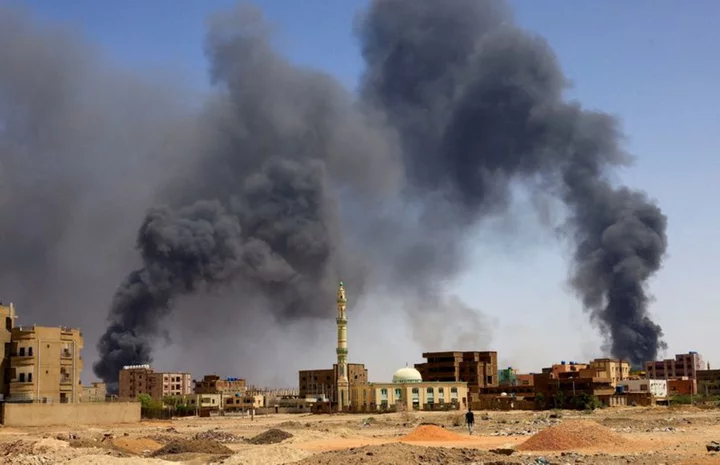By Khalid Abdelaziz
DUBAI (Reuters) -Sustained clashes and air strikes could be heard on Monday in parts of Sudan's capital, residents said, hours before the expiry of a shaky ceasefire deal that had brought some respite from a six-week-old conflict but little humanitarian access.
Residents reported battles in all three of the adjoining cities that make up Sudan's greater capital around the confluence of the Nile - Khartoum, Omdurman and Bahri. The intensity of the fighting was greater than over the past three days, they said.
Sudan's army and the paramilitary Rapid Support Forces (RSF) have been locked in a power struggle that erupted into conflict on April 15, killing hundreds and driving nearly 1.4 million people from their homes.
Air strikes, which the army has been using to target RSF forces embedded in neighbourhoods across the capital, could be heard in Omdurman on Monday afternoon, residents said.
"Since yesterday evening there has been bombardment with all types of weapons between the army and the Rapid Support," Hassan Othman, a 55-year-old resident of Omdurman, told Reuters by phone. "We're in a state of great fear. Where's the truce?"
Both sides have said they are considering extending a deal for a week-long ceasefire that was designed to allow for the distribution of aid and is due to expire at 9.45 p.m. local time (1945 GMT) on Monday.
An army source told Reuters that the army would condition any new truce deal on the RSF's exit from civilian homes and hospitals.
Saudi Arabia and the United States are remotely monitoring the ceasefire deal and have appealed for its renewal, though they said both sides have violated the truce and impeded humanitarian access and restoration of essential services.
The head of the U.N. refugee agency told Reuters that a projection that one million people could flee Sudan by October may prove a conservative estimate.
More than 350,000 people have already fled into neighbouring countries, with most heading to Egypt, Chad and South Sudan.
ORPHANAGE DEATHS
Across the country, the health ministry has said more than 700 people have died as a result of the fighting, though the true figure is likely much higher.
It has separately recorded up to 510 deaths in El Geneina, one of the main cities in Darfur, a western region already scarred by conflict and displacement.
In Khartoum, factories, offices, homes and banks have been looted or destroyed. Power, water and telecommunications are often cut, there are acute shortages of medicines and medical equipment, and food supplies have been running low.
At Sudan's largest orphanage, Reuters reported how dozens of babies have died since the start of the conflict, which one Khartoum State official attributed mainly to staff shortages and recurrent power outages caused by the fighting.
The truce deal has brought some respite from heavy fighting but sporadic clashes and air strikes have continued.
The United Nations and aid groups say that despite the truce, they have struggled to get bureaucratic approvals and security guarantees to transport aid and staff to Khartoum and other places of need.
A statement from Saudi Arabia and the U.S. late on Sunday cited breaches of the truce including air strikes and commandeering of medical supplies by the army, and the occupation of civilian buildings and looting by the RSF.
"Both parties have told facilitators their goal is de-escalation to facilitate humanitarian assistance and essential repairs, yet both parties are posturing for further escalation," it said.
(Reporting by Khalid AbdelazizWriting by Aidan Lewis, Editing by William Maclean and Giles Elgood)

